 Petzlover
Petzlover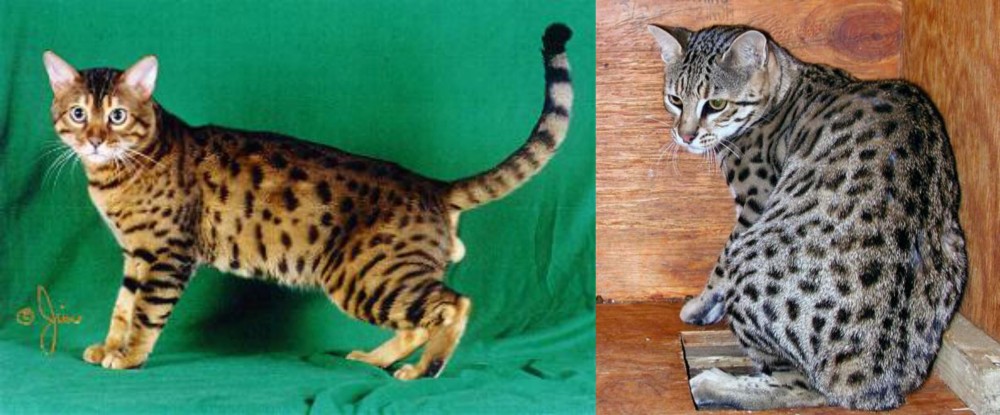 Both Bristol and Safari are originated from United States. Both Bristol and Safari are having almost same weight. Both Bristol and Safari has same life span. Both Bristol and Safari has same litter size. Both Bristol and Safari requires Low Maintenance.
Both Bristol and Safari are originated from United States. Both Bristol and Safari are having almost same weight. Both Bristol and Safari has same life span. Both Bristol and Safari has same litter size. Both Bristol and Safari requires Low Maintenance.
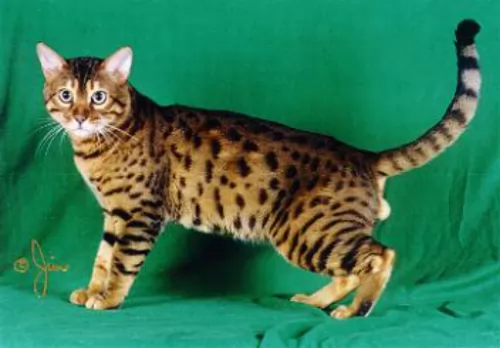 The Bristol cat hails from Texas and was developed during the 1980s, using a south American wild cat and domestic cats.
The Bristol cat hails from Texas and was developed during the 1980s, using a south American wild cat and domestic cats.
The Bristol cat isn’t well-known and in fact, its origins are shrouded in mystery.
The cat was recognized and admitted into the TICA (The International Cat Association. It is looked upon as a hybrid breed or a designer cat.
Nobody seems to know when the first Bristol cat was even bred. Because of its exotic nature, it is believed to be a cross between the American Shorthair and the margay or similar breed.
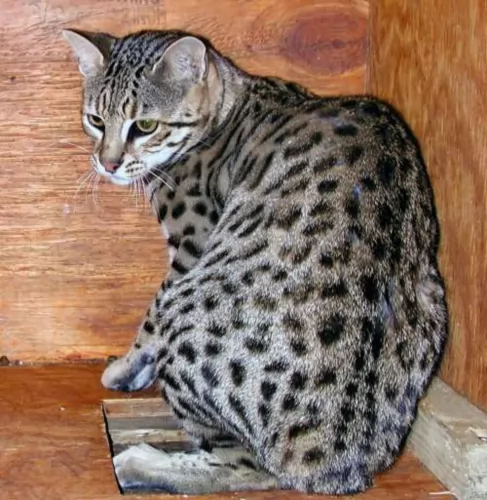 The Safari Cat, hailing from the USA, is one of the rarest breeds of cats. There are only about 70 of these cats registered at the International Cat Association.
The Safari Cat, hailing from the USA, is one of the rarest breeds of cats. There are only about 70 of these cats registered at the International Cat Association.
The Safari cat is a mix of a moggy and Geoffroy's cat. At first, the cat was used for research purposes by Washington State University but then cat breeders took over the development of the breed.
The name ‘Safari’ was chosen because of its wild look.
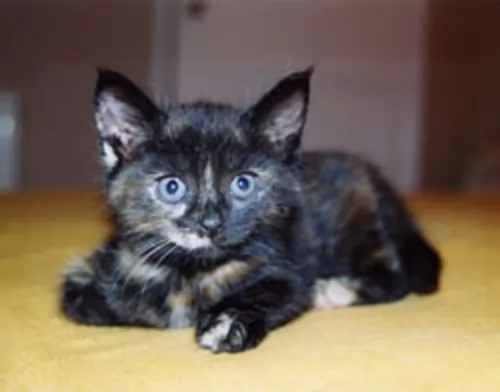 Bristol cats are medium-sized and muscular, powerful cats. They are much like Bengal cats. They have a smokey charcoal appearance while others have quite a bit of white on them.
Bristol cats are medium-sized and muscular, powerful cats. They are much like Bengal cats. They have a smokey charcoal appearance while others have quite a bit of white on them.
They also have rosettes and small rounded ears. The origins of the Bristol breed are uncertain but it seems a multi-colored cat was adopted by a United States Army captain in Australia.
The cat was so adored it was brought back when they returned to the United States. The cat was already pregnant and she gave birth to 2 kittens. The coats are shiny and short-haired with spots and lines of fawn, grey and brown mostly with the eyes being green.
The Bristol cat has a very pleasing disposition – being amicable, playful, and loving. They’re intelligent cats too but they need to spend time in solitude as well.
They definitely don’t respond and bond to everyone in the human family but tend to respond to only one person.
These Bristol cats are cunning and self-confident and because of their wild side, they will need a large area to roam. This is definitely not a cat for city life.
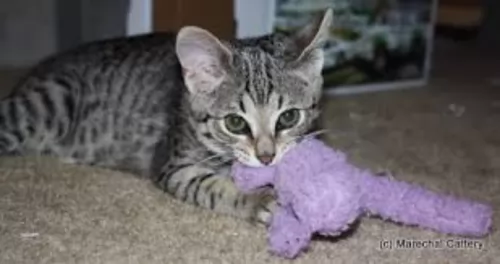 The hybrid Safari cat is a medium to large-sized cat that at first weighed in the region of 15kg, but the cat now weighs roughly 11kg.
The hybrid Safari cat is a medium to large-sized cat that at first weighed in the region of 15kg, but the cat now weighs roughly 11kg.
Its body is much like that of the wild parent, the Geoffroy – muscular and compact. The ears aren’t particularly large and are smallish, rounded ears with a fairly broad head.
It has a typical wild cat look and is a spotted or rosetted cat breed. Below the spots, the coat is a silvery grey shade.
The coat which is short actually comes in a variety of colors that come from both cat breeds. The eyes of this cat are either yellow or green. The Safari cat certainly has a wild cat appearance, because of the cross-breeding. This is a rare cat and because of this, there is no breed standard for it.
They can live to be between 17 and 20 years of age.
Even though one of the parent breeds is a wild cat, the Safari cat is described as an easy-going cat that can make a good pet.
The cat is very intelligent and playful and will enjoy swimming and climbing. It is for this purpose that he needs to have quite a large outside enclosure with a pool of sorts so that he can paddle.
There isn’t much information on their interaction with children and other pets in the home. While they are quite likely to make good pets where there are children, there would have to be supervision where there are small children. During play, these cats can bit. It would be extremely important to teach children to respect any animal and to be gentle and kind to them.
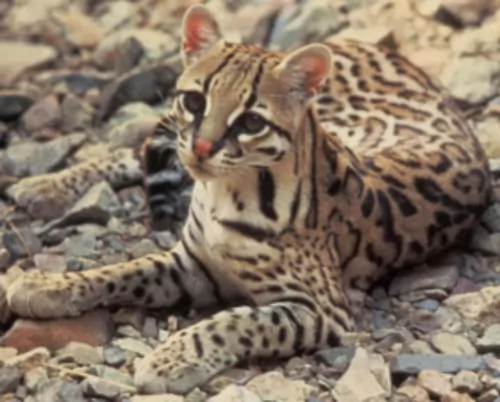 The Bristol cat is beautiful all right, but once again humans should just leave wild cats alone in the bush.
The Bristol cat is beautiful all right, but once again humans should just leave wild cats alone in the bush.
Mixing them with domestic cats doesn’t work in the long run, and many of these cats land up in shelters because of unruly behavior. The Bristol cat is part wild and it doesn’t seem to have a future although there isn’ enough information online to really know what its future is.
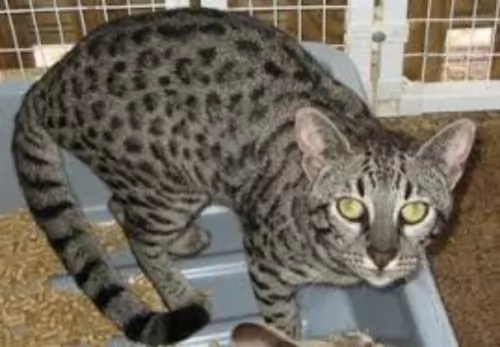 As a hybrid cat, your Safari is interesting alright, but unfortunately, you can’t ever be 100% sure of a hybrid cat. It needs careful consideration before you bring one into your home.
As a hybrid cat, your Safari is interesting alright, but unfortunately, you can’t ever be 100% sure of a hybrid cat. It needs careful consideration before you bring one into your home.
Apart from coming into the home from time to time, hybrid cats need an outside enclosure too that is securely fenced and gated and with a roof.
You made a decision to buy a cat with a wild side. It may live up to all your expectations but it may not either.
When you do research you find that the biggest number of behavioral complaints from owners of hybrid cats are about aggression issues and the refusal to use a litter box when indoors.
There is still a raging debate going on as to whether hybrids make suitable pets, but when you bring any animal into your home, as a responsible adult it is your job to provide well for it to ensure its happiness.
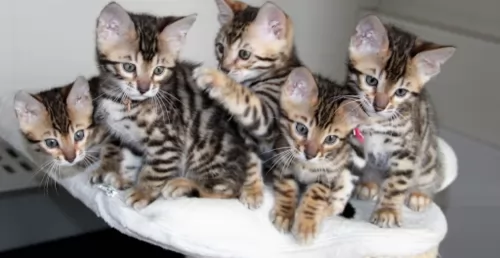 The Safari cat isn’t a particularly well-known breed so there isn’t much information on their health. They can suffer from the same illnesses as non-hybrid domestic cats.
The Safari cat isn’t a particularly well-known breed so there isn’t much information on their health. They can suffer from the same illnesses as non-hybrid domestic cats.
Certain hybrid breeds, such as the Safari, can sometimes have issues with reproduction as some cats are infertile. Domestic cats and wild cats have a different number of chromosomes and this results in reproductive problems, and stillbirths are quite common.
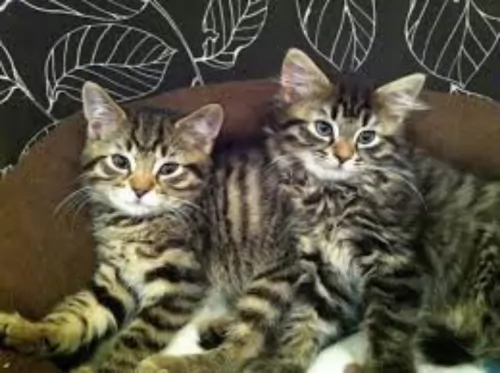 The diet of a cat such as the Bristol will include small rodents, however once domesticated, these cats will need a diet high in protein. The cat is a carnivore and to be healthy it will require high-quality premium commercial cat food that is appropriate for the age of your cat and his health status.
The diet of a cat such as the Bristol will include small rodents, however once domesticated, these cats will need a diet high in protein. The cat is a carnivore and to be healthy it will require high-quality premium commercial cat food that is appropriate for the age of your cat and his health status.
The best cat food has taurine in it, an essential protein that cats can only obtain through quality food. Your adult Bristol cat may prefer eating several smaller meals and this is actually a good idea as smaller frequent meals help towards greater urinary tract health.
If you want a healthy cat, you have to be diligent with providing such a cat with good food that is high in protein. If you aren’t sure, your veterinarian will be able to advise you on what to feed your new cat or kitten.
Factors such as age, size, activity levels, and health make a difference to what you feed your cat, how much and how frequently.
Get into a habit of reading and understanding the labels on the cat food packaging. Certainly, every cat requires taurine, an essential amino acid. You will also need to ensure fresh, cool water day and night.
Always take your pet to the veterinarian if he is lethargic ad disinterested in his food.
Most cats are clean, but you should brush or comb your Bristol cat regularly as the brushing helps keep your cat's coat shiny and also reduces the amount of hair during shedding.
Provide your Bristol cat with a dry, warm sleeping area and keep the bedding clean.
Your Bristol cat needs to wear a safety collar and an ID tag. These ID tags or an implanted microchip can help ensure that your Bristol cat is returned if he becomes lost.
Cats scratch, and cutting your cat’s nails will keep the nails blunt. Nonetheless, to prevent your furniture from being scratched, provide your cat with a strong scratching post covered with a rough material such as sisal or tree bark.
Bristol cats are independent and they don’t require any kind of special care. Certainly, they require large areas for their active lifestyle as well as a shallow pool for swimming.
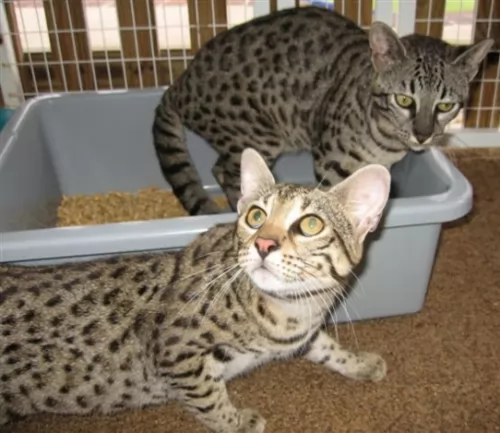 It is recommended that you brush this cat each week. He isn’t a big shedder but the brushing once a week keeps the fur in good condition, removing loose hairs and dust.
It is recommended that you brush this cat each week. He isn’t a big shedder but the brushing once a week keeps the fur in good condition, removing loose hairs and dust.
A high protein diet is imperative. Cats are carnivores and a meat diet is imperative. You can speak to your vet or a cat expert about feeding your Safari cat. Certainly, they need to be fed high-quality cat food. These foods are available in wet and dry form.
He will definitely need some raw meat. Make sure you understand the ingredients in some low- quality cat foods as corn for cats can be a problem for them, hard to digest and it could cause intestinal problems.